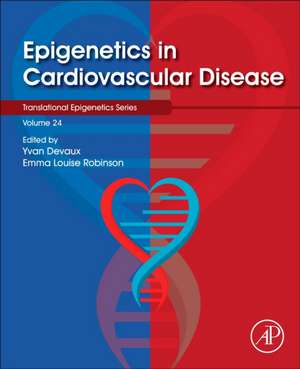Epigenetics in Cardiovascular Disease: Translational Epigenetics, cartea 24
Editat de Yvan Devaux, Emma Louise Robinsonen Limba Engleză Paperback – 10 mar 2021
- Offers a thorough overview of role of epigenetics mechanisms in cardiovascular disease
- Includes guidance to improve research plans, experimental protocols design, quality and reproducibility of results in new epigenetics research
- Explores biomarkers and drug targets of therapeutic potential to advance personalized healthcare
- Features chapter contributions from a wide range of international researchers in the field
Din seria Translational Epigenetics
- 18%
 Preț: 553.82 lei
Preț: 553.82 lei - 19%
 Preț: 659.12 lei
Preț: 659.12 lei - 23%
 Preț: 1206.43 lei
Preț: 1206.43 lei - 28%
 Preț: 915.82 lei
Preț: 915.82 lei - 24%
 Preț: 519.00 lei
Preț: 519.00 lei - 9%
 Preț: 783.84 lei
Preț: 783.84 lei - 23%
 Preț: 824.68 lei
Preț: 824.68 lei - 26%
 Preț: 949.33 lei
Preț: 949.33 lei - 27%
 Preț: 924.87 lei
Preț: 924.87 lei - 27%
 Preț: 804.68 lei
Preț: 804.68 lei - 27%
 Preț: 919.72 lei
Preț: 919.72 lei - 23%
 Preț: 918.41 lei
Preț: 918.41 lei - 28%
 Preț: 910.33 lei
Preț: 910.33 lei - 24%
 Preț: 956.09 lei
Preț: 956.09 lei - 26%
 Preț: 694.46 lei
Preț: 694.46 lei - 9%
 Preț: 1147.82 lei
Preț: 1147.82 lei - 19%
 Preț: 833.02 lei
Preț: 833.02 lei - 27%
 Preț: 848.75 lei
Preț: 848.75 lei - 24%
 Preț: 846.30 lei
Preț: 846.30 lei - 22%
 Preț: 684.94 lei
Preț: 684.94 lei - 24%
 Preț: 799.69 lei
Preț: 799.69 lei - 22%
 Preț: 940.43 lei
Preț: 940.43 lei - 9%
 Preț: 799.39 lei
Preț: 799.39 lei - 21%
 Preț: 942.98 lei
Preț: 942.98 lei - 25%
 Preț: 727.60 lei
Preț: 727.60 lei - 23%
 Preț: 810.69 lei
Preț: 810.69 lei - 23%
 Preț: 789.43 lei
Preț: 789.43 lei - 23%
 Preț: 791.73 lei
Preț: 791.73 lei - 23%
 Preț: 812.29 lei
Preț: 812.29 lei - 23%
 Preț: 803.71 lei
Preț: 803.71 lei - 27%
 Preț: 967.96 lei
Preț: 967.96 lei - 28%
 Preț: 703.10 lei
Preț: 703.10 lei - 25%
 Preț: 872.39 lei
Preț: 872.39 lei - 29%
 Preț: 827.81 lei
Preț: 827.81 lei - 20%
 Preț: 711.92 lei
Preț: 711.92 lei - 23%
 Preț: 729.96 lei
Preț: 729.96 lei - 23%
 Preț: 805.50 lei
Preț: 805.50 lei
Preț: 794.89 lei
Preț vechi: 1034.89 lei
-23% Nou
Puncte Express: 1192
Preț estimativ în valută:
152.12€ • 165.18$ • 127.78£
152.12€ • 165.18$ • 127.78£
Carte tipărită la comandă
Livrare economică 15-29 aprilie
Preluare comenzi: 021 569.72.76
Specificații
ISBN-13: 9780128222584
ISBN-10: 0128222581
Pagini: 498
Ilustrații: 80 illustrations (40 in full color)
Dimensiuni: 191 x 235 x 33 mm
Greutate: 1.02 kg
Editura: ELSEVIER SCIENCE
Seria Translational Epigenetics
ISBN-10: 0128222581
Pagini: 498
Ilustrații: 80 illustrations (40 in full color)
Dimensiuni: 191 x 235 x 33 mm
Greutate: 1.02 kg
Editura: ELSEVIER SCIENCE
Seria Translational Epigenetics
Public țintă
Human geneticists; human genomicists; translational researchers in genomic medicine, epigenetics, cardiovascular disease, biochemistry, and molecular biology; life science researchers; developmental biologistsCuprins
SECTION I INTRODUCTORY INFORMATION
1. The ever-growing burden of cardiovascular disease
2. Epigenetics concepts: An overview
3. From classical signaling pathways to the nucleus
SECTION II EPIGENETICS MECHANISMS IN CARDIOVASCULAR DISEASE
4. DNA methylation in heart failure
5. Histone modifications in cardiovascular disease initiation and progression
6. RNA modifications in cardiovascular disease—An experimental and computational perspective
7. Regulatory RNAs in cardiovascular disease
8. Regulation of splicing in cardiovascular disease
9. Cardiac transcriptomic remodeling in metabolic syndrome
10. Sex differences in epigenetics mechanisms of cardiovascular disease
11. Epigenetics in cardiac development and human induced pluripotent stem cells
SECTION III BIOMARKER VALUE
12. Peripheral blood DNA and RNA biomarkers of cardiovascular disease in clinical practice
13. Epigenetics and physical exercise
14. Long noncoding RNAs and circular RNAs as heart failure biomarkers
15. Artificial intelligence in clinical decision-making for diagnosis of cardiovascular disease using epigenetics mechanisms
SECTION IV THERAPEUTIC POTENTIAL
16. Therapeutic strategies for modulating epigenetic mechanisms in cardiovascular disease
SECTION V METHODOLOGICAL ISSUES
17. Single-cell RNA sequencing in cardiovascular science
18. Good laboratory and experimental practices for microRNA analysis in cardiovascular research
19. Analytical challenges in microRNA biomarker development: Best practices for analyzing microRNAs in cell-free biofluids
20. Concept of biological reference materials for RNA analysis in cardiovascular disease
21. Unbiased bioinformatics analysis of microRNA transcriptomics datasets and network theoretic target prediction
1. The ever-growing burden of cardiovascular disease
2. Epigenetics concepts: An overview
3. From classical signaling pathways to the nucleus
SECTION II EPIGENETICS MECHANISMS IN CARDIOVASCULAR DISEASE
4. DNA methylation in heart failure
5. Histone modifications in cardiovascular disease initiation and progression
6. RNA modifications in cardiovascular disease—An experimental and computational perspective
7. Regulatory RNAs in cardiovascular disease
8. Regulation of splicing in cardiovascular disease
9. Cardiac transcriptomic remodeling in metabolic syndrome
10. Sex differences in epigenetics mechanisms of cardiovascular disease
11. Epigenetics in cardiac development and human induced pluripotent stem cells
SECTION III BIOMARKER VALUE
12. Peripheral blood DNA and RNA biomarkers of cardiovascular disease in clinical practice
13. Epigenetics and physical exercise
14. Long noncoding RNAs and circular RNAs as heart failure biomarkers
15. Artificial intelligence in clinical decision-making for diagnosis of cardiovascular disease using epigenetics mechanisms
SECTION IV THERAPEUTIC POTENTIAL
16. Therapeutic strategies for modulating epigenetic mechanisms in cardiovascular disease
SECTION V METHODOLOGICAL ISSUES
17. Single-cell RNA sequencing in cardiovascular science
18. Good laboratory and experimental practices for microRNA analysis in cardiovascular research
19. Analytical challenges in microRNA biomarker development: Best practices for analyzing microRNAs in cell-free biofluids
20. Concept of biological reference materials for RNA analysis in cardiovascular disease
21. Unbiased bioinformatics analysis of microRNA transcriptomics datasets and network theoretic target prediction
